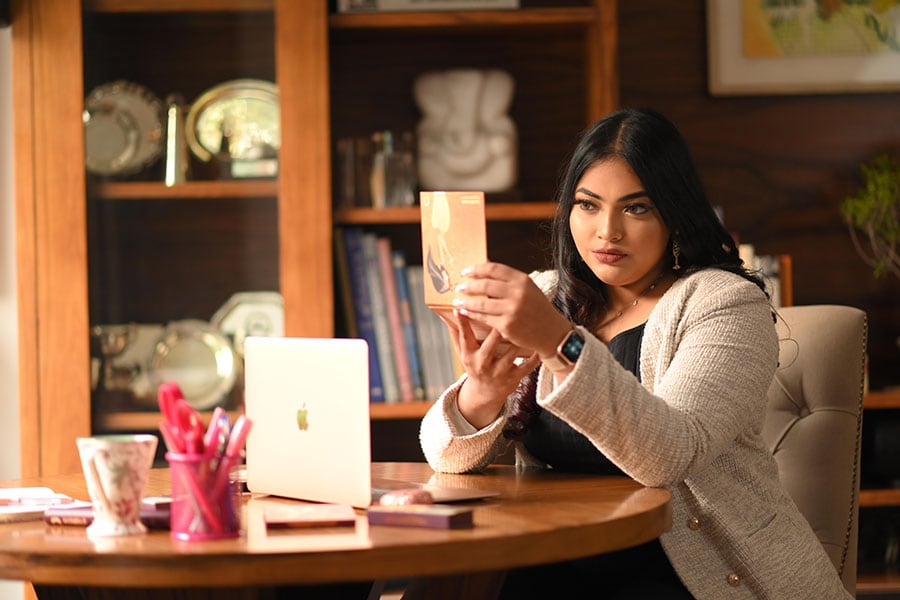How Gen-Z women are redefining Indian beauty
Building beauty brands that embody self-expression and self-care, new and young entrepreneurs are addressing the needs of their generation


While studying for her bachelor’s degree in chemistry from Carnegie Mellon University, Delhi-based Ananya Kapur, 24, explored the concept of remedial beauty, creating formulations from her kitchen during the Covid lockdown. “I concocted skincare products, because let"s face it, skincare was having a moment. TikTok was buzzing with ingredient talk, and I thought, ‘Why not give it a whirl?’"
The first of the many products that emerged from her kitchen was a preservative-free blue-coloured gel-based moisturiser, which she distributed to family and friends. In 2021, she launched a skincare-infused, vegan and cruelty-free makeup brand, Type Beauty, catering to well-informed makeup enthusiasts in their 20s and 30s. “In just a decade, the beauty industry has transitioned from creating products that could pose potential harm to skincare-centric beauty," she says. Bootstrapped by her family’s investments, Type Beauty has been developed to be a user’s best friend, as, “Their confidant, helping them break free from societal beauty standards and embracing their unique ‘type’," says Kapur.
Kairavi Bharat Ram, 25, a scion belonging to the Bharat Ram family, was housebound while struggling with depression a few years ago. She found an outlet through watching makeup tutorials on YouTube and blogging. “I was terrible at applying makeup, but it didn’t matter because it gave me a surge of confidence I so desperately needed that. It helped me express myself and feel good about myself."
Her followers clamoured for tutorials with Indian brands, a space which Bharat Ram found lacking. Sensing a gap in the market for a homegrown label that was fun, exciting and accessible, she launched Typsy Beauty. “I felt that products were not differentiated here they didn’t have fun concepts, a stark identity and they also lacked quality. That’s when my dream to start a brand was born." She partnered with labs which have worked with international labels such as Fenty, Rare Beauty and Huda Beauty in Italy and Korea and other countries, developing products such as Typsy’s best-selling Shade shifter pH changing lip and cheek oil which has racked up sales of over 10,000 units in less than six months. “We worked closely with the labs to ensure that the formulation, colour range and packaging is designed to suit Indian weather and our diverse range of skin tones," she says.
These two represent Gen-Z women building brands targeting India’s booming beauty market, pegged at $15.6 billion in 2022 and projected to reach $17.4 billion by 2025, according to Euromonitor. Gen-Z will make up a quarter of the Asia-Pacific (APAC) region population by 2025, according to a McKinsey report, comprising a major cohort of consumers seeking to experiment and express themselves through beauty brands that are inclusive, effective and tailored to their lifestyles.
 Kairavi Bharat Ram, Founder, Typsy Beauty
Kairavi Bharat Ram, Founder, Typsy Beauty
India’s beauty market is a segment ripe for disruption and the charge is being led by younger consumers, who are redefining the segment. In 2022, global beauty behemoth Estée Lauder Companies’ New Incubation Ventures (NIV), a strategic early-stage investing and incubation arm, partnered with Nykaa to launch the Beauty&You awards in India. Their agenda is to discover and nurture the next generation of beauty entrepreneurs in the Indian market, identifying disruptive beauty brands and founders. For the debut edition, they received over 300 entries across 50 Indian cities, including a multitude of beauty brands across categories—skincare, haircare, fragrance and colour cosmetics.
The winner of the first edition was Divya Malpani, 23, behind gender-neutral, vegan and cruelty-free beauty brand Skinvest. Its product range touches upon concerns not openly discussed, including a Bomb Bum Cream for skin tightening with ingredients such as Vitamin E, caffeine and ginger oil, and Light it Up, a pigmentation correcting body mist to correct darker underarms, inner thighs, knees and elbows, containing beauty’s buzziest infusions, retinol and baukichiol.
Shana Randhava, senior vice president, New Incubation Ventures, believes that Malpani’s clear vision, addressing pain points and frustrations experienced by her peers with different skin types helped her win. “By focusing on gender neutrality and mental health advocacy, Skinvest has invested in concepts that inspired and excited us about what the future of our industry holds. The brand ethos seamlessly bridges the gap between clinical and cool, while delivering efficacious solutions," says Randhava.
For the Northeastern University graduate, Malpani’s audacious approach paid off. “Many well-known skincare brands that the Indian population has been using for years were primarily formulated, tested and made for Caucasian skin. Furthermore, I noticed that most skincare brands focussed on concerns like anti-ageing, which didn"t necessarily resonate with the modern and outgoing Gen-Z and millennial population of India," says Malpani. According to her, skincare should be accessible and enjoyable for everyone, regardless of gender. “In India, skincare was often perceived as a feminine chore, and I wanted to challenge this perception. Skinvest was born with the goal of disrupting stereotypes and promoting mental health advocacy," she says.
According to The Beauty Market in 2023: A special State of Fashion, when it comes to sustainability, beauty consumers avoid ingredients that harm the environment and seek out 100 percent natural, cruelty-free and no animal testing formulations. In fact, more than half the Gen-Z and millennials are willing to pay a premium for a sustainable brand.
Meghna Kaurani, 24, is the founder of Necessary, which she describes as “an honest skincare brand" combining the benefits of ayurveda and science. Started in 2022, the vegan brand avoids cosmetic chemicals said to be detrimental to health, including parabens (preservatives), synthetic fragrances, aluminium and silicone. With less than half a dozen products, Kaurani has applied this minimalistic philosophy to the ingredients too. “Our philosophy is not to add anything to our products to make them stand out instead, we pare them back and distill each formula down to the most essential, naturally active ingredients. Our formulas are simple, considered and effective, and our ingredients are sourced locally to reduce carbon footprint."
Waste is an elephant in the room in the industry. A notorious polluter, the cosmetics industry produces 120 billion units of packaging, a majority of which cannot be recycled. Necessary is instead using glass bottles and boxes made from FSC-certified paper, helping both primary and secondary packing be recyclable.
Kapur’s Type Beauty has an extensive product range, including 24 shades of foundations each catering to four separate skin categories. On the drawing board is a beauty recycling initiative that will accept empties in exchange for a new product, a practice followed by a few global beauty brands.
 Meghna Kaurani,Founder, Necessary
Meghna Kaurani,Founder, Necessary
Between 2015 and 2022, global ecommerce sales grew at 20 percent CAGR. By 2022, digital shopping overtook specialty retail as the largest individual sales channel worldwide, accounting for around one-fifth of the industry’s overall total, according to The Beauty Market in 2023: A special State of Fashion. Operating primarily in the DTC (direct to consumer) space, these young Indian beauty companies are poised to tap digital natives. “India is still a developing market for beauty, and the current crop of buyers, especially Gen-Zs, are willing to experiment with products. Functionality, ease of use and concern-targeting products top the list while the ever-expanding ecommerce universe adds to sales," says Randhava.
Typsy Beauty has adopted a more physical approach to building the DTC brand, focusing on building an online and offline presence. “The recent addition of our kiosk at DLF Promenade is just the beginning, as we actively seek more retail partners and spaces to provide customers with an immersive Typsy experience. Additionally, we are expanding our online presence through strategic partnerships with renowned platforms such as Nykaa, Amazon and Tira Beauty," says Bharat Ram.
Beauty&You’s white paper Decoding the Indian Beauty Landscape states that online distribution channels are expected to grow at CAGR of 30 percent, the fastest across all distribution channels, with social media influencers and advertisements being key sources of brand discovery. Anshita Mehrotra, 24, started Fix My Curls in 2019, an Indian brand for naturally curly hair after she was fed up of damaging her hair with smoothening treatments. Helping women embrace their curls, Mehrotra has created a community of over 66,000 people on Instagram. “We make sure our brand has a niche personality. We use topical memes, short-form video content, and informative guides to market our product and maintain a sense of community with our customers. We run ads using well-known faces on social media, this helps build brand credibility and makes all that top of the funnel marketing easier. For us, social media has become just as conventional as any other traditional marketing form."
Being a young female entrepreneur, even with familial support, isn’t a cakewalk. Trying to get perceived by others as an authority figure was a struggle, says Kapur. "I’ve been called ‘emotional’ and ‘whimsical’ by headstrong suppliers who would hold off the delivery and not deem themselves answerable since they are not familiar to women working in the manufacturing sector," she says, and has since kept a middleman to secure a line of strict communication and keep her authority intact.
But the future is bright. Randhava shares some advice for this young cohort. “In the beauty industry, women entrepreneurs have unique and powerful perspectives to offer. Stay true to your vision, continuously learn, and adapt—don"t be afraid to take calculated risks." The returns are bountiful and beautiful.
First Published: Nov 08, 2023, 15:10
Subscribe Now